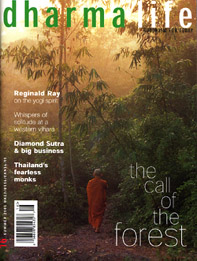Full-Scale Anti-Climax
Expectations are high. The 1999 Salzburg Festival, no less, has commissioned the internationally famous composer, Philip Glass (a Zen Buddhist) to write a large work as part of the millennium celebrations. The audience includes distinguished patrons, recording company executives and the world's press. The work has 12 movements that last more than 100 minutes and involves a large chorus, a children's choir, five soloists and a symphony orchestra. CDs add to the hype: the same performers have made a committed, well produced, lavishly presented studio recording, conducted by the able and committed Dennis Russell Davies.
Any big work called 'Symphony' inevitably invites comparison with the great achievements of Beethoven, Bruckner or Mahler. The composer's own blurb explains the high aspirations of the symphony's subtitle, Requiem, Bardo, Nirmanakaya. 'The millennium [is] a bridge between the past (represented by the Requiem), the present (the Bardo representing the 'in between') and culminating in Nirmanakaya (the future manifestation of Enlightened activity).' His plan 'represents a spectrum of the world's "wisdom" traditions', including texts from the Bible, Koran, Tibetan Book of the Dead, the Buddha's Fire Sermon, Shantideva's Bodhicaryavatara, Rumi and so on. Glass clearly aims to say something big and significant.
Philip Glass has written many large-scale scores for film and theatre, several with Robert Wilson. In the operas Satyagraha, Akhnaten and Einstein on the Beach, now more than 20 years old, Glass used static, block-like music to create vast, reflective, mesmerising stage rituals. These works have divided critical opinion, but, at their best, they explore the risky area around the monotony of ritual. In the theatre the music is one part of a visual and dramatic experience.
But in concert works this musical style causes problems for an audience used to listening for depth and subtlety. The music in this Symphony is mostly very simple: characteristically, series of harmonies are articulated as simple broken chords, in blended orchestration, with clear harmonic bass lines. Sometimes a simple scalar counter-melody or a decorative layer of percussion is added. In fact large chunks sound like a backing tape for a piece of music that we never actually hear.
The music relies on repetition (lots and lots of it!), juxtaposing contrasting blocks, and ending summarily. It is obsessive and at its best intriguing, even mesmerising. But because it doesn't aim for a denouement or catharsis, the repetition creates a sense of latent aggression.
The setting of the texts precludes personal expression. The music for the Fire Sermon and 'Judgement and Apocalypse' is louder and faster, but it is hardly subtle and articulates little of the content of these texts. In the final sections ('Paradise' and 'Dedication of Merit') Glass relieves the discomfort by introducing a gentler kind of obsessively repetitive music. But this is overlain with a veneer of cosy (commercially-inspired?) sentimentality. Does that match your vision of a Pure Land?
The best that can be said is that the texts embrace all mankind, and that in outline it offers a Buddhist view of Samsara and the possibility of Enlightenment. But I would much rather listen to a religious work that comes out of a depth of experience.
Philip Glass Symphony no. 5 Requiem, Bardo, Nirmanakaya, Nonesuch 7559 79618-2 (2CDs)
Taradasa, freelance music teacher and writer, worked for many years at the British Music Information Centre



